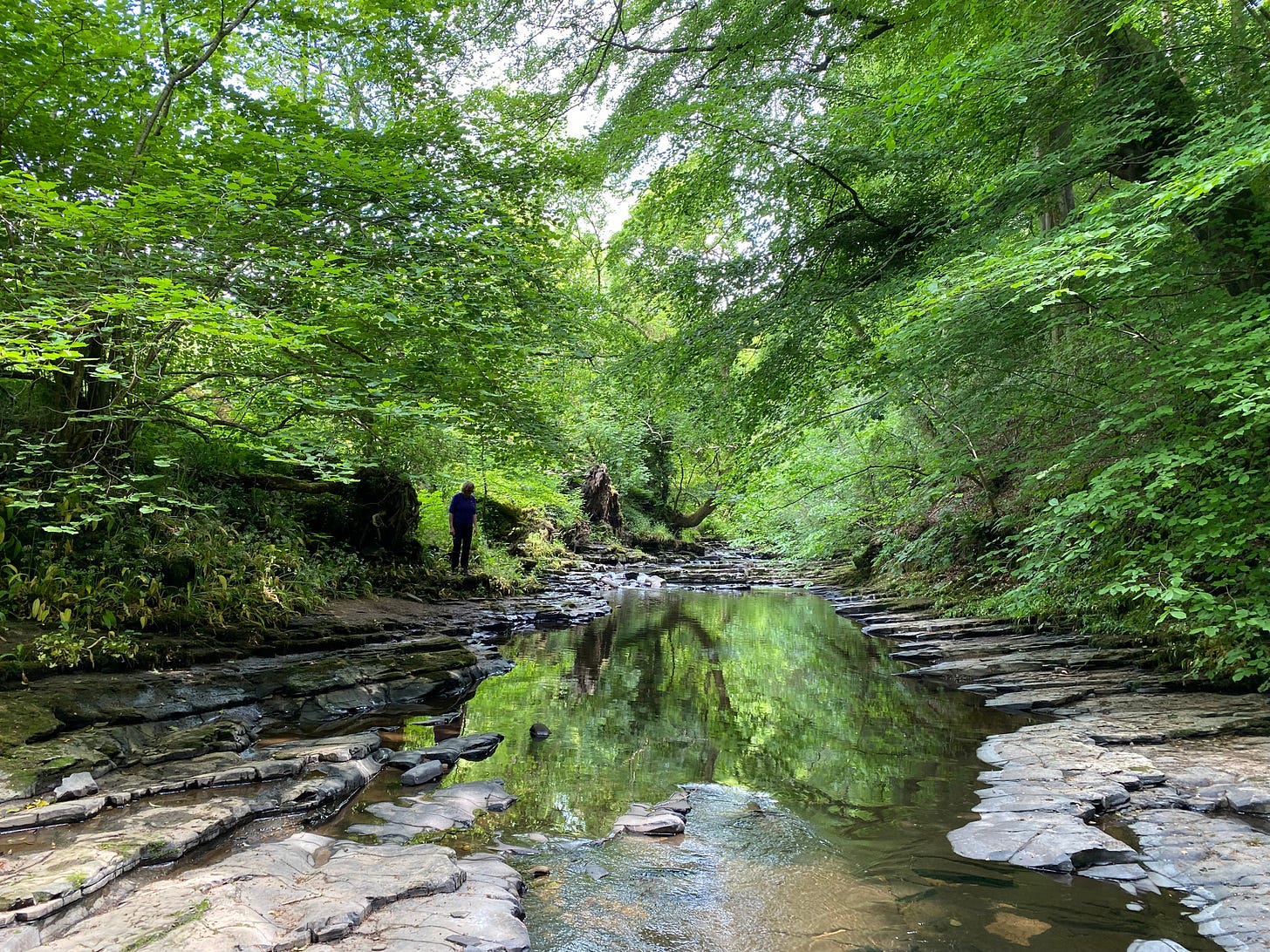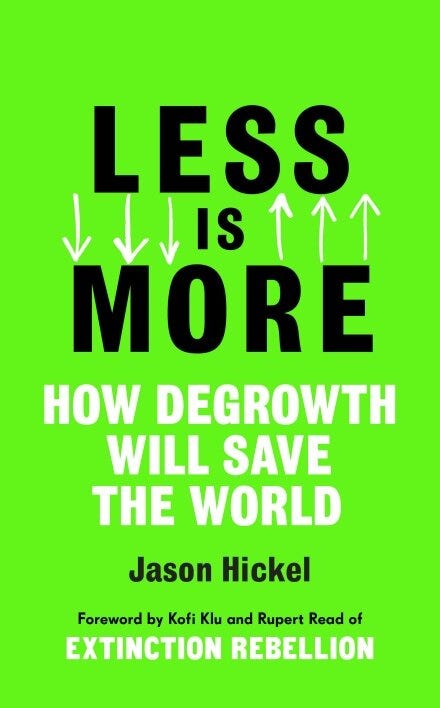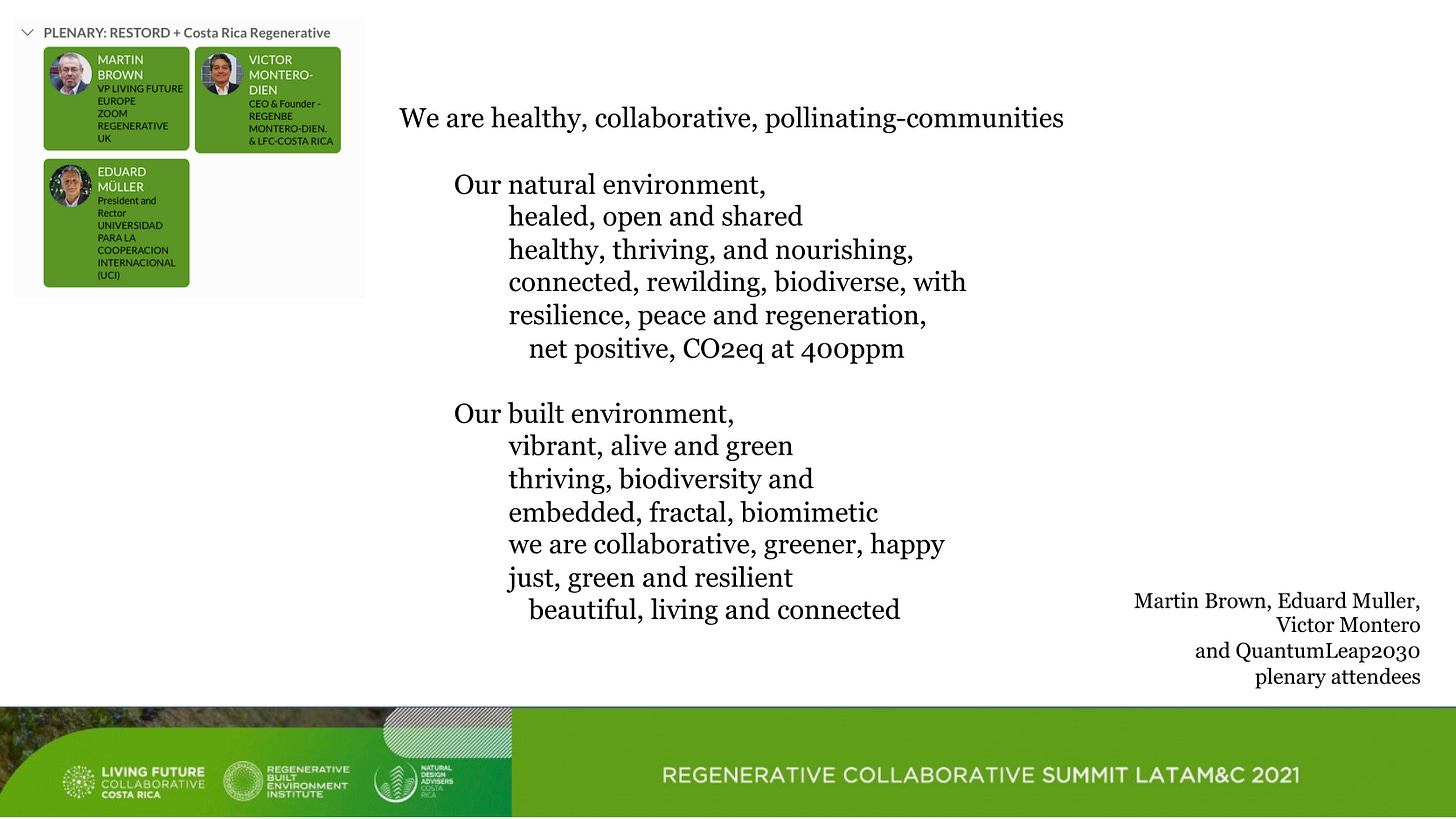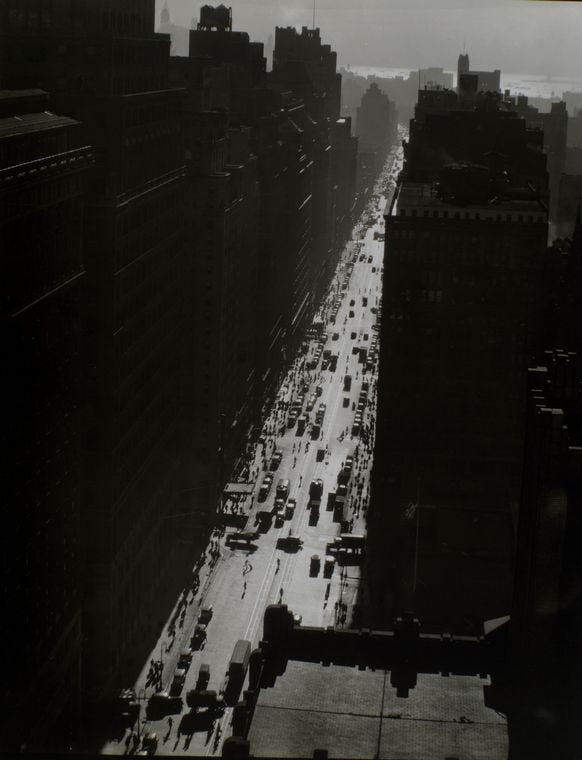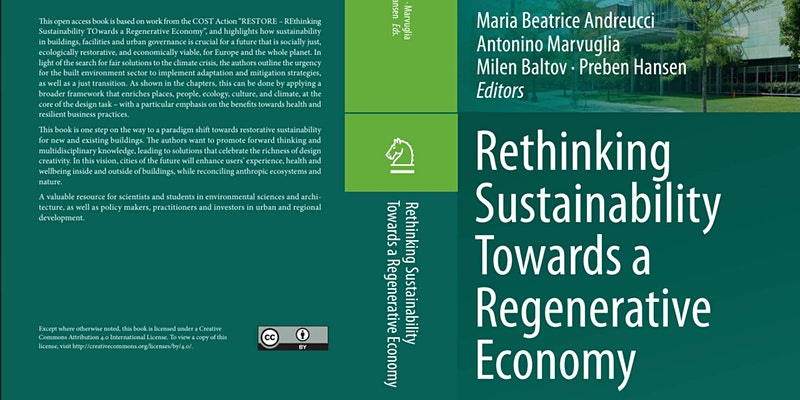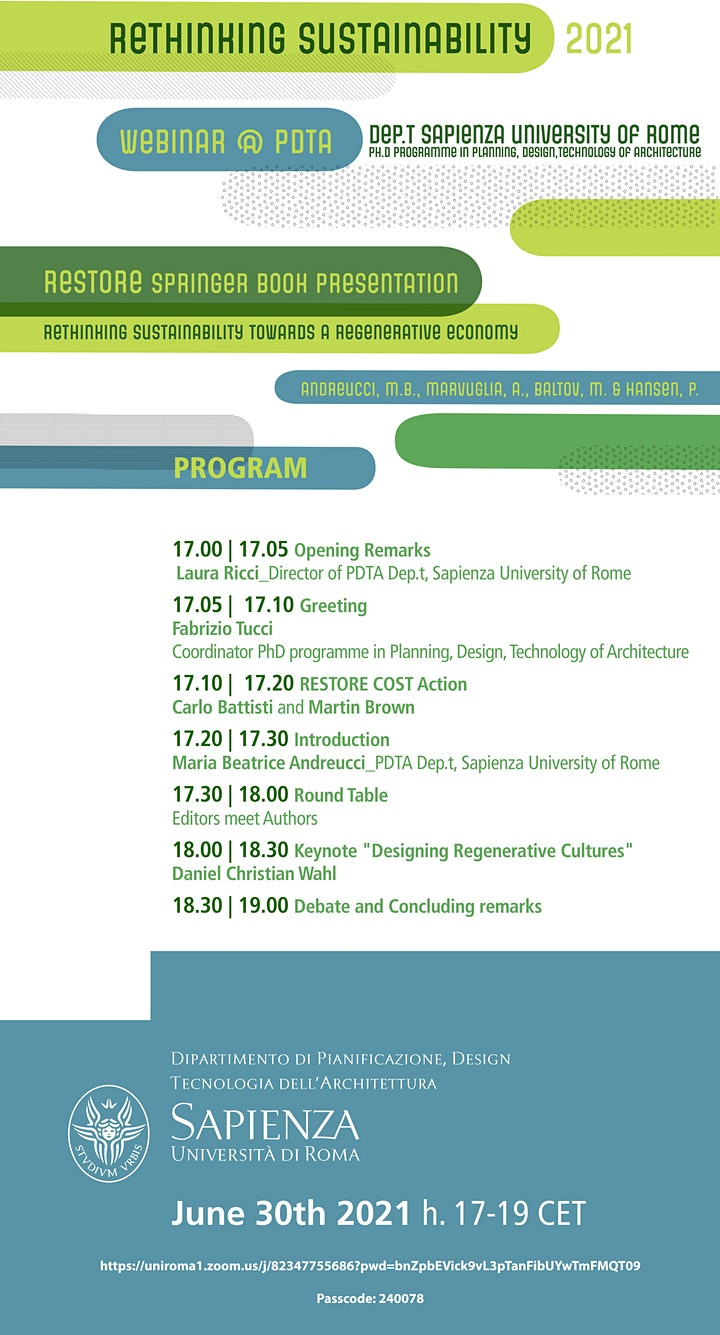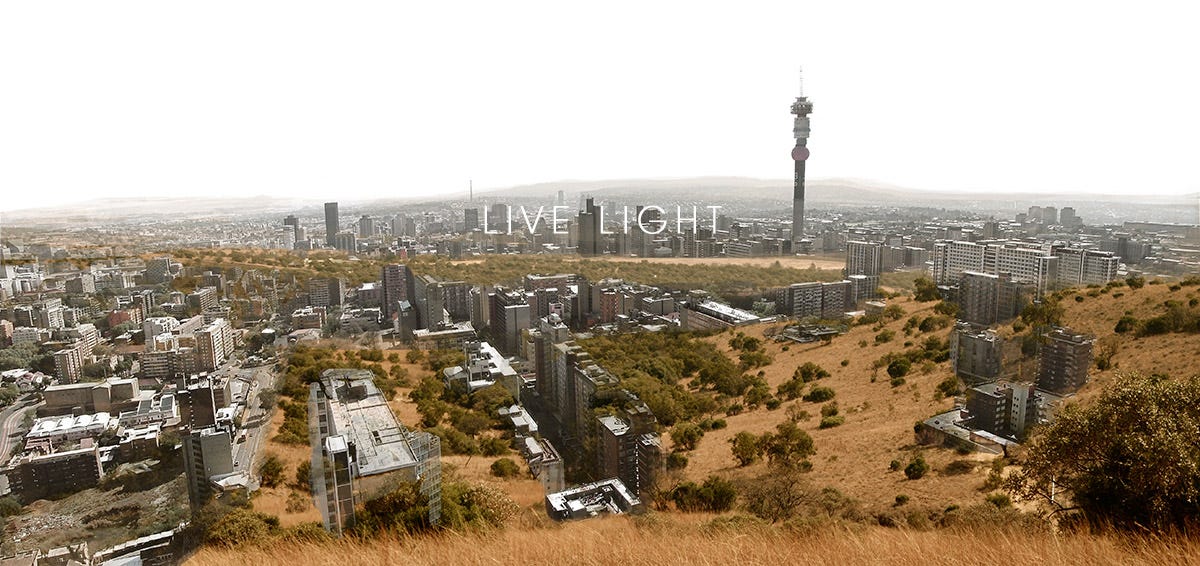Regen Notes #13
DeGrowth, Reciprocity, Carbon, Place, Nature Net Gain, Climate, Biophilia, RESTORE, Events, Zoom Regenerative.
Welcome to Regen Notes, a fortnightly newsletter of regenerative news, stories and more, with a sideways focus on the built environment, curated by Martin Brown. Regen Notes is a companion to Zoom Regen.
On Degrowth,
Architect Fringe concluded a series of events with a Degrowth world cafe, recorded through an informative Miro board. The event included a provocation from Mike Small, (Bella Caledonia and Enough Scotland) yet one of the key takeaways was the question:
“What ‘perceived’ (economy) pearls of wisdom we are now questioning will we have to unlearn?”
And relatedly, the European Environment Agency, in its briefing Growth Without Economic Growth has acknowledged that green growth is unlikely and calls for post-growth and degrowth alternatives within EU policy.
Economic growth is closely linked to increases in production, consumption and resource use and has detrimental effects on the natural environment and human health. It is unlikely that a long-lasting, absolute decoupling of economic growth from environmental pressures and impacts can be achieved at a global scale; therefore, societies need to rethink what is meant by growth and progress and their meaning for global sustainability. (From the European Environment Agency, Briefing Growth without economic growth)
And a salient comment from Jason Hickel’s book Less is More that resonates so close with the ‘degenerative or regenerative’ thinking at Zoom Regenerative …
The economy is ultimately our material relationship with each other and with the rest of the living world. We have to decide whether we want that relationship to be based on extraction and exploitation, or reciprocity and care.
On Reciprocity,
In All We Can Save, Janine Benyus tells of her experience in forestry and ecology, and how a dominant narrative of individualism shaped forestry science for 5 decades. This prevented us from understanding what was happening beneath the soil, and the ways that trees exchange nutrients, and are healthier in a collective with diverse species. This is a theme that resonates throughout Suzanne Simards’ work and book, Finding the Mother Tree. (Simard leads the final session of the Emergence Magazine’s book club on 8th July)
For my keynote at the beautiful Quantum Leap conference hosted by Regenbe in Costa Rica, I shared Postcards from the Future, work from RESTORD 2030 - more on this in future Regen-Notes. Did you know that by 2030, building sustainability standards had become based on reciprocity, rewarding what a building ‘does’ - what it gives to, and contributes to healing the future, rather than egocentric certification badges of what the building ‘is’.
During the Quantum Leap plenary, through the collaborative imagining of the natural and built environments we strive for, attendees shared their visions, from which emerged a lovely piece of writing:
Carbon
A draft Carbon Reduction Code for the built environment, for use by clients, consultants, contractors and supply chain members across all sectors of construction, has been published by the Cambridge Centre for Smart Infrastructure and Construction
Derby Assembly Rooms’ carbon cost of demolition laid bare, The carbon cost of demolishing and replacing the Derby Assembly Rooms is equivalent to more than a third of the city council’s entire annual greenhouse gas footprint, reported AJ. A comment from Chris Brown, (Igloo Regeneration and COP26 built environment ambassador) goes to the heart of the struggle we will increasingly face - to balance scarce resources, society’s needs and planet needs.
Place
From the New York Review article by Robert Macfarlane ‘the Landscape Within Us, my current reading is Micheal Bond’s Wayfaring: “Humans don’t possess inbuilt bio-compasses, but we do have something arguably more powerful: storytelling. Our remarkable navigational ability as a species is closely connected to our ability to tell stories about ourselves that unfold both backward and forward in time”
Wayfaring popped up in a beautifully rich Zoom Regenerative conversation with John Renwick, Anna Williamson and myself. The hour-long chat circled John's knowledge and expertise in Vastu Architecture, exploring midsummer, seeing the sun as an asset, place, building orientation, wayfaring, geomancy and of course Vastu. The conversation will appear in a series of ZR podcast style conversations shortly.
Net Gain for Nature
The UK government is proposing an amendment to the Environment Bill currently working through Parliament, which will require major national infrastructure projects to provide a net gain for nature. Seen as a formal response to the Dasgupta review published in February this year, which found that the planet is being put at ‘extreme risk’ by the failure of economics to account for the environment, concluding human development comes at a ‘devastating cost’ to life-sustaining ecosystems”.
Another missed opportunity? - This amendment could and should be expanded to include all public projects, even all construction. As it is it would give license for the project to continue putting life-sustaining ecosystems at extreme risk. The response also falls short on a key Dasgupta review to adopt an alternative form of national accounting to GDP, which includes the state of the natural world.
Climate
Now widely shared across many news channels AFP broke news on a draft UN report, Crushing climate impacts to hit sooner than feared.
Climate change will fundamentally reshape life on Earth in the coming decades, even if humans can tame planet-warming greenhouse gas emissions, according to (the landmark draft report from the UN’s climate science advisors) Species extinction, more widespread disease, unliveable heat, ecosystem collapse, cities menaced by rising seas -- these and other devastating climate impacts are accelerating and bound to become painfully obvious before a child born today turns 30.
"‘The choices societies make now will determine whether our species thrive or simply survives as the 21st century unfolds’ Intergovernmental Panel on Climate Change (IPCC)
Meanwhile, The West Coast Is About to Be Scary Hot
The heatwave is a symptom of the climate crisis, which is making extremes like this more common and more intense. It also shows how the climate crisis creates compounding problems. The West is amid a disastrous megadrought that relentless heat has played a role in driving. Among other things, the drought has caused Lake Mead to drop to a record low, led farmers to tear out water-intensive crops, and curtailed development. This is only the beginning, though. Climate change is expected to keep increasing the odds of heat and megadrought this century. The records that could fall this weekend and early next week will surely not be the last. But if what we’re seeing out West is any indication, we have a lot of work to do to ensure water systems, cities, and forests are ready for what comes next.
Biophilia
Zoom Regen 34 was a nourishing Regen biophilia session, led by Joe Clancy outlining the 14 Patterns of Biophilic Design and their application within design and buildings. The conversation, rich with experience, questions, references and stories that deepen our understanding of biophilia, as a love of life.
An important exploration of Biophilic Design and Nature Connectedness from Miles Richardson - emphasising the need to look wider than biophilia as seen through Kellert’s Biophilic Design categories (direct, indirect, space and place). Recent nature connectedness research shows direct and active engagement with the principles of biophilic design are essential. Yet, rather than just design elements such as plants, wildlife and water, the pathways to nature connectedness (senses, emotions, beauty, meaning and compassion) represent the types of activity to prompt with those natural elements.
Words, often more than definitions shape our sense of place and culture. Sustainability words give the power to inspire or deflate, or to give a hiding place to do nothing or to greenwash. Martin Brown, Restore
On Weds NEW INC in New York hosted a beautiful conversation with Maria Popova and Patrick Rosal on an exploratory discussion on art, cities, and nature in search of new visions for urban life, and in expression of the ways creative practices re-nature our cityscapes. The conversation ranged across music, sounds, picking up on Gathering Moss (Robin Wall Kimmerer), Here is New York (E.B. White) and Lost Words (Macfarlane and Morris). The latter in relation to a thread on the loss of identity through words dropping out of children dictionaries and place naming, primarily urban street names, all reinforcing the loss of connectivity with nature and place within our cities. A key takeaway was the theme of attention that the conversation often circled back to often.
Events for your diary
Rethinking Sustainability
Our RESTORE Springer Book Presentation with a keynote from Daniel Wahl on the 30th of June is open for registration.
In light of the search for fair solutions to the climate crisis, the panellists will outline the urgency for the built environment sector to implement adaptation and mitigation strategies, as well as a just transition. This can be done through a broader framework that enriches places, architecture, people, ecology, culture, and climate, at the core of the design task. There is a particular emphasis on the benefits of health, resilient construction and business practice.
For Zoom Regenerative 35 we are delighted to welcome Marc Sherratt from the City of Johannesburg, South Africa, sharing insights from his work at MSSA, (considered one of the leaders in the Green Building and sustainable architecture movement on the African continent) on themes dear to our hearts at ZR, those of place and ecology. Registration and Details
And then for ZR36 on the 13th of July, Zoom Regenerative is unLeashed, This will be an unconference session based on reciprocity, and the topic for the first Regen unLeashed will be Degrowth. Here you ask the questions you seek answers to, and your share passion and expertise you think will help others. Details soon.
Connecting.
You can find links, connect and support our work through Linktree.

